Webinar to highlight student-curated exhibition on Black portraiture
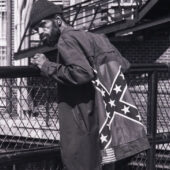 “Representation Matters: Art, Space and Racial Restitution,” a webinar co-sponsored by Hanes Gallery, Wake Forest University’s Slavery, Race and Memory Project and Wake the Arts, will be held Wednesday, Sept. 30 from 6 to 7:30 p.m. The panel will be moderated by humanities professor Corey D. B. Walker and feature conversations around the works. The event is free and open to the public. Registration is required.
“Representation Matters: Art, Space and Racial Restitution,” a webinar co-sponsored by Hanes Gallery, Wake Forest University’s Slavery, Race and Memory Project and Wake the Arts, will be held Wednesday, Sept. 30 from 6 to 7:30 p.m. The panel will be moderated by humanities professor Corey D. B. Walker and feature conversations around the works. The event is free and open to the public. Registration is required.Categories: Arts & Culture, Happening at Wake, Inclusive Excellence, Research & Discovery

 Establishing Wake Forest University as a more diverse and inclusive campus that builds bridges in the Winston-Salem community and maintains that commitment is a priority across the University. In 2019, President Nathan O. Hatch created the President’s Commission on Race, Equity and Community to lead this essential work.
Establishing Wake Forest University as a more diverse and inclusive campus that builds bridges in the Winston-Salem community and maintains that commitment is a priority across the University. In 2019, President Nathan O. Hatch created the President’s Commission on Race, Equity and Community to lead this essential work.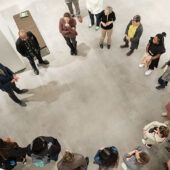
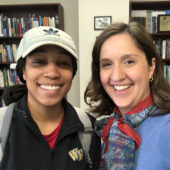 As civil unrest continues across the country and with fall sports in jeopardy because of the COVID-19 pandemic, two Wake Forest professors are examining how professional athletes’ political statements have the ability to impact people’s racial attitudes.
As civil unrest continues across the country and with fall sports in jeopardy because of the COVID-19 pandemic, two Wake Forest professors are examining how professional athletes’ political statements have the ability to impact people’s racial attitudes.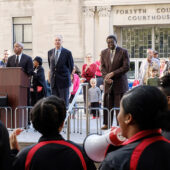 At 3 p.m. on Feb. 23, about 225 people gathered at the Millennium Center in downtown Winston-Salem for a vigil commemorating the 60th anniversary of the Winston-Salem sit-in. Organized by Wake Forest and Winston-Salem State universities, the event featured remarks by Wake Forest President Nathan O. Hatch and Winston-Salem State Chancellor Elwood L. Robinson, a keynote address by WFU Dean of the School of Divinity Jonathan L. Walton and music by The WSSU Singing Rams.
At 3 p.m. on Feb. 23, about 225 people gathered at the Millennium Center in downtown Winston-Salem for a vigil commemorating the 60th anniversary of the Winston-Salem sit-in. Organized by Wake Forest and Winston-Salem State universities, the event featured remarks by Wake Forest President Nathan O. Hatch and Winston-Salem State Chancellor Elwood L. Robinson, a keynote address by WFU Dean of the School of Divinity Jonathan L. Walton and music by The WSSU Singing Rams. Each February, the Wake Forest University community gathers for Founders’ Day Convocation to observe the founding of the University in 1834. At this year’s event, Wake Forest President Nathan O. Hatch acknowledged the University’s participation in the institution of slavery. He offered an apology for how Wake Forest benefitted from the labor and sale of enslaved people.
Each February, the Wake Forest University community gathers for Founders’ Day Convocation to observe the founding of the University in 1834. At this year’s event, Wake Forest President Nathan O. Hatch acknowledged the University’s participation in the institution of slavery. He offered an apology for how Wake Forest benefitted from the labor and sale of enslaved people.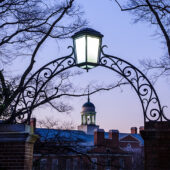 What can we learn from the past? Wake Forest University legal scholar and Associate Provost Kami Chavis explains, “If you want to have a transformative institutional change, you have to begin examining the past and the root causes of underlying issues to know what you need to do in the future.” Chavis is also co-chair of the Steering Committee of Wake Forest’s Slavery, Race and Memory Project.
What can we learn from the past? Wake Forest University legal scholar and Associate Provost Kami Chavis explains, “If you want to have a transformative institutional change, you have to begin examining the past and the root causes of underlying issues to know what you need to do in the future.” Chavis is also co-chair of the Steering Committee of Wake Forest’s Slavery, Race and Memory Project.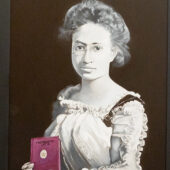 The course “Classics Beyond Whiteness” was originally limited to 15 students. Twenty-six registered. “I couldn’t turn students away,” said classics professor T.H.M. Gellar-Goad. The fall class was one of several planned courses, events and programming focusing on “Classics Beyond Whiteness” - a multidisciplinary collaboration that examines a misleading and damaging tendency to focus on white scholars and perspectives in claissical studies while excluding black voices.
The course “Classics Beyond Whiteness” was originally limited to 15 students. Twenty-six registered. “I couldn’t turn students away,” said classics professor T.H.M. Gellar-Goad. The fall class was one of several planned courses, events and programming focusing on “Classics Beyond Whiteness” - a multidisciplinary collaboration that examines a misleading and damaging tendency to focus on white scholars and perspectives in claissical studies while excluding black voices.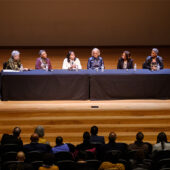 When they moved into a women’s residence hall in 1969, Beth Norbrey Hopkins and Deborah Graves McFarlane simply wanted to obtain a good education and weren’t thinking about making history as the first African American women to come to Wake Forest as resident students. But they did.
When they moved into a women’s residence hall in 1969, Beth Norbrey Hopkins and Deborah Graves McFarlane simply wanted to obtain a good education and weren’t thinking about making history as the first African American women to come to Wake Forest as resident students. But they did.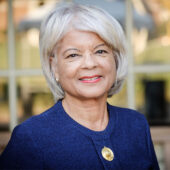 On Feb. 1, Beth Norbrey Hopkins and four other African American women will talk candidly about their experiences at Wake Forest in the early 1970s. The 9 a.m. panel discussion in Brendle Recital Hall commemorates the 50-year anniversary of the integration of women’s residence halls at Wake Forest.
On Feb. 1, Beth Norbrey Hopkins and four other African American women will talk candidly about their experiences at Wake Forest in the early 1970s. The 9 a.m. panel discussion in Brendle Recital Hall commemorates the 50-year anniversary of the integration of women’s residence halls at Wake Forest.